I was surfing through the Wayback Machine this afternoon and came across the earliest digital manifestations of Prince Edward Island’s Hansard from April 1996, 20 years ago.
What I’d forgotten is that when we created the system to post Hansard online, PDF as a format for distributing documents was not widely adopted (it was only 3 years old at the time). Although it would likely have been possible to read a PDF version of Hansard at the time, the creating of it would have been locked up inside expensive, proprietary software that wouldn’t have connected to the word processing system of the day used to create it, at least not without great expense.
We were a hearty, lean band of web-makers. And so we used HTML.
If memory serves this worked through some sort of automated Perl script that sucked in the word processor file and output HTML. I wish we’d been better at archiving things.
The benefits of this approach were manifest: not only could one read Hansard in any old web browser, but because we were able to structure the data and produce works of beauty like this page indexing a day’s sitting by MLA speaking.
So you can, for example, see all the things that Alan Buchanan said on April 17, 1996, and then jump directly to each one. Like this, where he answered a question on the introduction of the 911 system to the province (“we hope to begin work on the development of the system and have it completed within the year”).
The PDF version is all that the contemporary Legislative Assembly produces; understandable for workflow reasons, perhaps, but a shame that we had, at the very dawn of the web, a more open, “web-like” solution to spreading Hansard far and wider.
For the last year I’ve been using Goudy’s Deepdene typeface for the body text here.
There’s been one glaring issue with this face in this digital realm: the number seven didn’t have enough heft to it, something you can see clearly here:

Now Deepdene isn’t a “hit you over the head with a rake” kind of typeface to begin with, so perhaps this isn’t fair criticism. But 2017 is almost upon us, and I couldn’t face a year of precious sevens.
And so, an upgrade: I’m now using Friedrich Althausen’s Vollkorn for both head and body; it’s a digitally-native face, far less precious, and with a commendable number seven.
Here’s something to illustrate the change:
Before, with Deepdene:

After, with Vollkorn:

The keen-eyed among you will notice that I’ve added some space between the head and the body, and I’ve decreased the size of the body text from 24pt to 20pt, leaving the line height the same.
The result, to my eye, is clearer, easier to read.
Let’s try it out for a while and see what happens.
There’s another plus that comes with the switch: I’m no longer using the PT Sans Google Web Font. Brendan Eich, in a talk in Vienna last month called How To Fix the Web, reminded me that the web today is chock full of signals that advertisers and others use to track behaviour from site to site. While his talk focused on web advertising, Google uses “free” tools like Google Analytics and Google Fonts to do much the same thing, something described well here. By using PT Sans served by Google, I was providing Google with a way of knowing who was viewing this site; I removed Google Analytics tracking two years ago, and ceasing use of PT Sans completes the de-Googling of what gets served here.
So now, when you view the front page of ruk.ca site in a browser, everything is coming from here, with no signals going to Google or elsewhere:
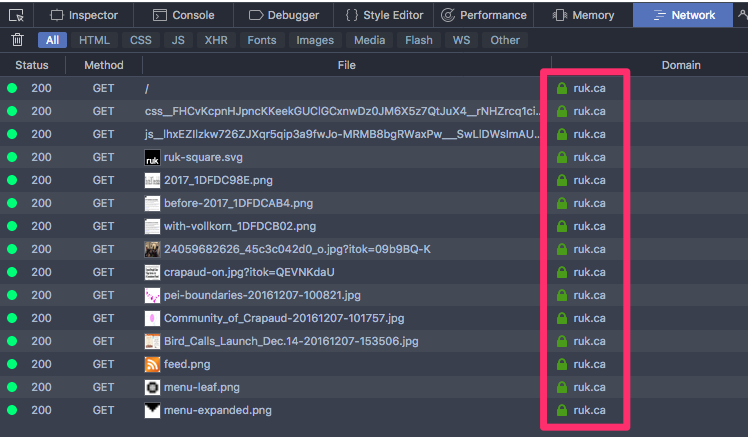
There’s still one signal I need to do something about, and that’s a ping that’s sent to Mollom, the comment-spam-filtering service, when you load a page with a comment for on it. Mollom’s not Google, but it’s still elsewhere, and I’d like to find a way around that.
Under the Canadian one passenger, one fare policy, people on the autism spectrum who are unable to fly, take the train, or take the bus without assistance on board can travel domestically with an attendant of their choosing, and their attendant travels for free. Indeed the policy applies to anyone with a disability that prevents travel without assistance.
Each company’s interpretation of the policy is slightly different, and there are different hoops you need to jump through to invoke this; generally there’s an application form, accompanied by a diagnosis or a statement from a doctor. A telephone call from the company’s medical office might come as follow up.
Oliver has taken advantage of this right several times on Air Canada; it’s a tremendous boom to his independence.
Here are the relevant pages on airline websites to get more information and the proper forms:
- Air Canada (called an “attendant”)
- WestJet (called a “personal attendant”)
- Porter (called a “personal attendant”)
- VIA Rail (called a “support person”)
- GO Transit (called a “support person”)
- Maritime Bus (called a “personal attendant”)
This just policy is based on national transportation policy that states, in part:
Persons with disabilities have the same rights as others to full participation in all aspects of society and equal access to transportation is critical to the ability of persons with disabilities to exercise that right. Persons with disabilities have the same needs to travel as others - for example, for business, for pleasure, and for medical reasons - and should have the same travel options that are provided to others, such as those respecting mode of transportation, departure times, cost, quality of service and the ability to travel with friends, family or colleagues;
Persons with disabilities should not be placed at an economic disadvantage as a result of their disabilities and should not have to pay more for their transportation services than other passengers who do not have disabilities, including in circumstances where transportation service providers must provide different services to ensure equivalent access to the federal transportation network. This principle of accessibility forms the basis of what is commonly referred to in the community of persons with disabilities as the principle of “one person-one fare” (1P1F), which underlies the application.
While the policy may be well-known in some circles, it came as news to us, and it’s only because of the kindness and quick thinking of a doctor in the Air Canada medical office, who mentioned it when we called to book our first trip flying with Oliver’s autism assistance dog.
Please spread the word to people with autism and their families so that everyone knows.
In February of 1950, the Legislative Assembly of Prince Edward Island passed An Act to Enable the Inhabitants of Certain Villages to Supply Themselves with Certain Services.
The first two villages to put forward the notion of incorporating under this Act were Crapaud and Parkdale; Crapaud’s rationale was described in The History of Crapaud:
Villages, in common with larger centers, have their own peculiar problems. One of ours was to equip and maintain an A.R.P. Fire-fighting unit, which we received early in the Second War, and which was badly in need of additional hose. This was done at first by voluntary contribution, but, as time passed, and costs increased, it seemed unfair that a few should bear the burden of expense, when all received the same service.
And so, as a means of working out a solution to our problem, a meeting was called in the Office of the Crapaud Creamery Co. on April 1, 1950. Those present were: B. C. Wood, R. N. Dawson, Parker Canfield, Ralph Myers, L. H. Rogerson, Earl Maynard, W. M. Waddell, John Leard, LeRoy Howatt, John Nicholson, George Wotton, John Simmons and A. P. Simmons.
The meeting immediately got down to business. On motion, B. C. Wood was appointed Chairman, and George Wotton, Sec’y. Mr. Wood stated that the purpose of our meeting was to discuss the possibility or desirability of having the Village of Crapaud incorporated under the Village Service Act, which Act had been passed at the last session of the Provincial Legislative Assembly.
After a good deal of discussion, the Sec’y was instructed to write the Attorney General, Hon. Walter E. Darby, and obtain copies of the Village Service Act, which Act would be thoroughly discussed at our next meeting. Several copies of the Act arrived on April 5.
A meeting was called for April 10, at 8 p.m. The above mentioned gentlemen were again present. After reviewing events thus far, the Chairman circulated copies of the Act, read certain sections, and finally asked all in turn to stand and speak for, or against. One man was fearful lest we be compelled to maintain our public road in the Incorporated area; another felt we should move cautiously; all the rest were quite enthusiastic, and wanted to proceed at once. Eventually, all signified their willingness to petition the Sheriff of Queens County, John L. Beaton, to conduct a Plebiscite to determine the wishes of the majority of the residents in this respect. It was further decided that the incorporated area should include all land and water within a half mile radius of Crapaud Bridge, which spans the Westmoreland River, on the present course of Highway Route No. 9. This petition was prepared and duly signed by a large number of qualified citizens, greatly in excess of the required number of twenty-five.
(This is the first mention I’ve found in the printed record of a decision to form incorporated Crapaud with round boundaries — see background here).
The nature of the plebiscite was laid out in a lovely blue broadside, a copy of which I found in the Public Archives:
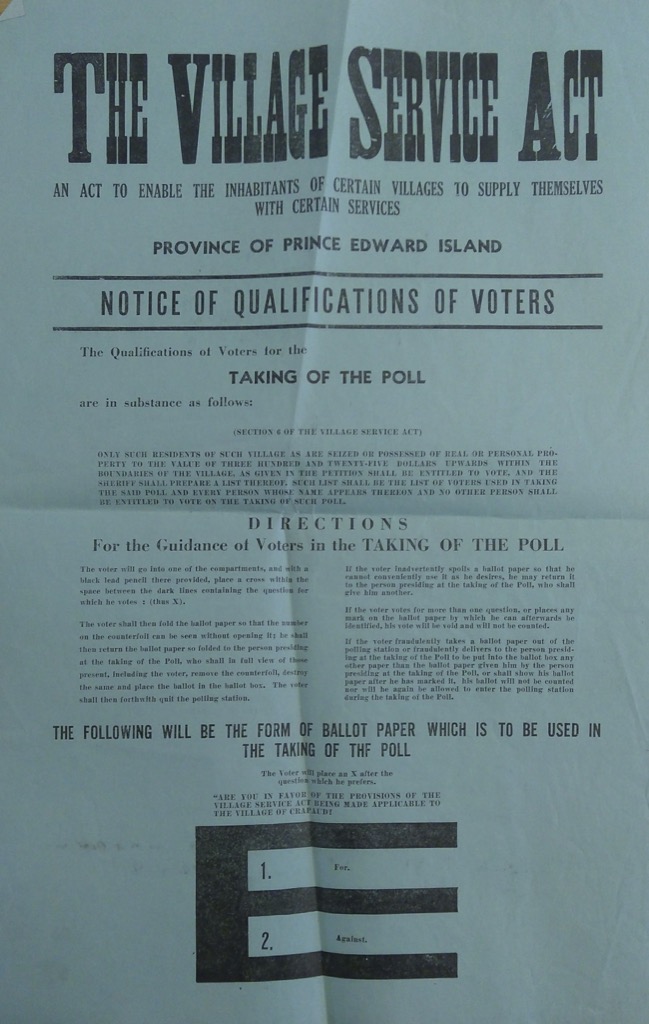
Public Archives and Records Office of Prince Edward Island
RG6.1: Supreme Court fonds. Series5: Case files, 1930-1959
Item number RG6.1/s5/ss3/6972
Reproduced with Permission
On May 22, 1950 the citizens of Crapaud held their plebiscite on the issue: The Guardian reported that 45 people voted “for,” and 36 “against” (there were 170 inhabitants of Crapaud at the time, reported the government the following year, so the voter turnout was around 46%).
The result of the plebiscite was almost immediately called into question; in the May 30 edition of The Guardian, a writer with pen name of “A Voice from the People” wrote:
Sir. — It is felt by many of the good people of Crapaud that the Government of this Province was very ill-advised in introducing at their last session an Act governing the incorporation of small villages. If it was the intention of the Government, in introducing this legislation, to promote discord and dissension in these villages, then their objective has certainly been fully met as far as Crapaud is concerned. We hear much these days of a “cold war”. A war is fast developing here in Crapaud, that promises to be anything but cold, over the result of the recent plebiscite. Some fear the introduction of this Act so keenly they are already planning if and when it becomes operative here to dispose of their property and move out. It is felt by many the thing for Crapaud, particularly for those in the lower income brackets. Future generations, it is thought will note this date of May 22, 1950, as the date that marked the beginning of the decline of Crapaud. Prospective home seekers and home builders will avoid this place as they would a plague because of a steadily mounting spiral of taxation that inevitably follows the incorporation of any small place.
In regard to the election itself which was carried out on May 22 a full and careful investigation would seem to be indicated. It is alleged that the list of names sent the Sheriff and on which he based his decision to call this election contained names of persons living quite outside this electoral zone. It is thought if this proves to be correct the election should be declared void on this count alone. The publication of this list would at once clear up this point.
It is further alleged that only persons known to favor this incorporation scheme were chosen as scrutineers, the negative side of the issue being unrepresented.
It is also alleged that persons known to favor incorporation and who were quite ineligible to vote were allowed to do so. In fact the whole affair seems to have left behind an unsavory odor.
It should be clearly understood, however, that in none of these things was the Sheriff in any way to blame, as far as he was able to judge everything being correctly done.
I am, Sir, etc.,
A VOICE FROM THE PEOPLE
Crapaud, P.E.I.(With regard to the above complaints, Sheriff Beaton states (1) that the list of names submitted on which he based his decision to call the election, did not contain the names of any persons living outside the electoral zone; (2) that the scrutineers were appointed at a duly called meeting of the community, and (3) that anyone with personal property of the value of $325 was entitled to vote. —Ed. G.)
By June 26, 1950, the paper reported, the Provincial Government opted to refer the matter to the Supreme Court for a consideration, Executive Council having set aside “a sum not exceeding Three hundred dollars” as counsel fee on June 8, 1950:
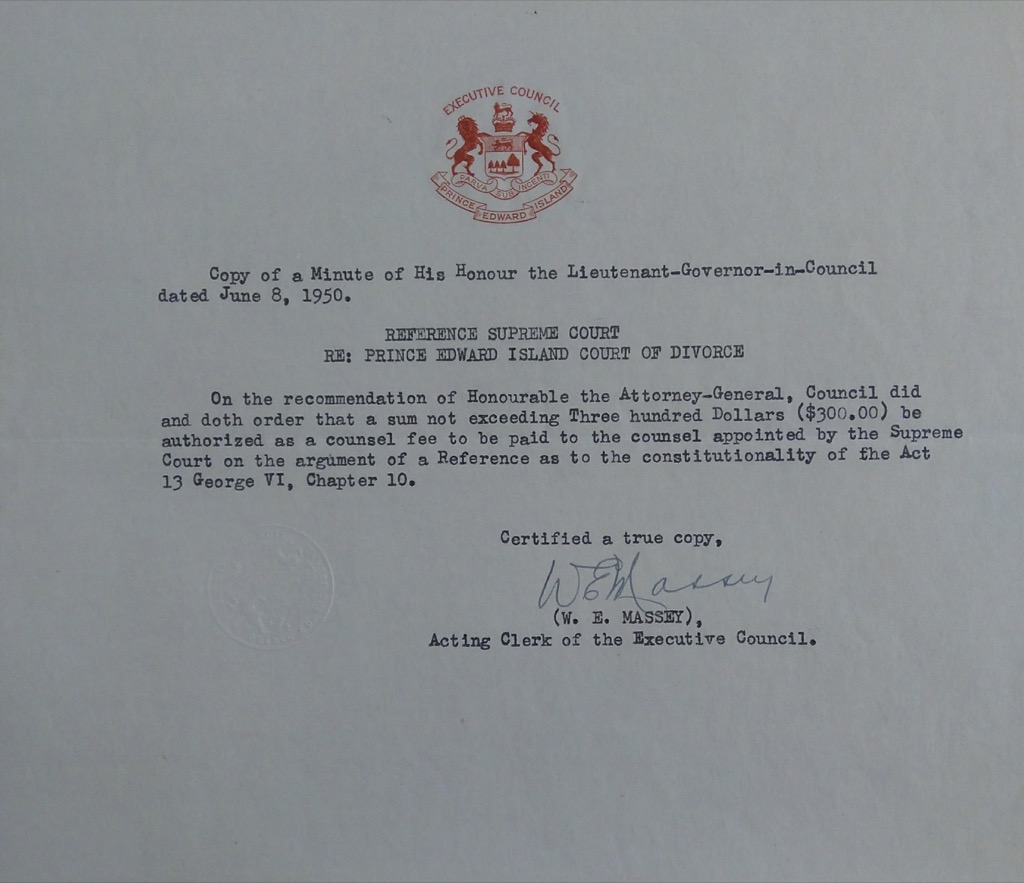
Public Archives and Records Office of Prince Edward Island
RG6.1: Supreme Court fonds. Series5: Case files, 1930-1959
Item number RG6.1/s5/ss3/6972
Reproduced with Permission
The court reference itself asked the “Supreme Court in banco of the Province of Prince Edward Island for hearing and consideration,” as follows (PDF):
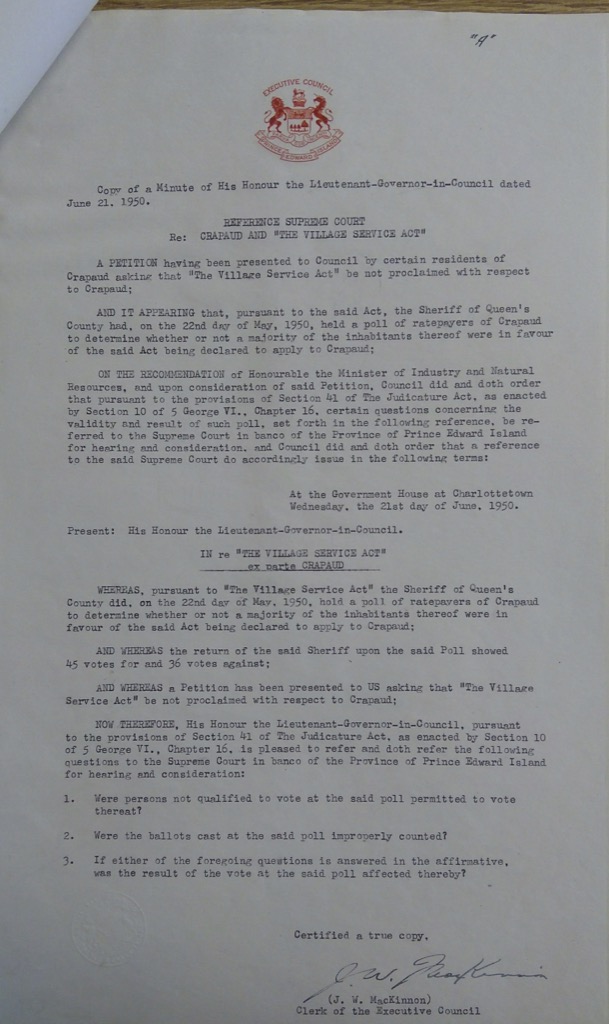
Public Archives and Records Office of Prince Edward Island
RG6.1: Supreme Court fonds. Series5: Case files, 1930-1959
Item number RG6.1/s5/ss3/6972
Reproduced with Permission
In the file in the Public Archives that contains items related to the reference are samples of the ballots used in the plebiscite, including this spoiled one, marked both yes and no:
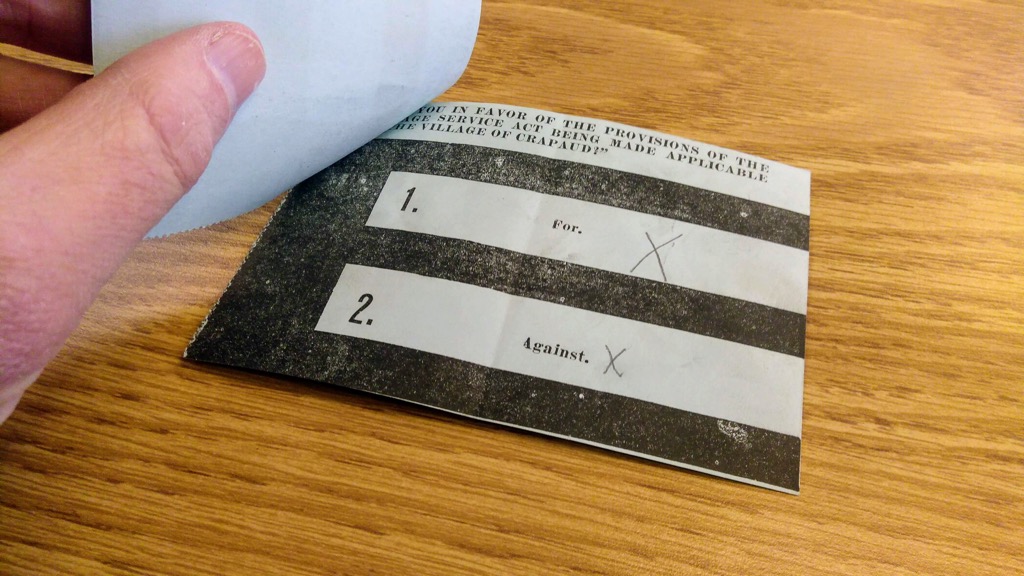
Public Archives and Records Office of Prince Edward Island
RG6.1: Supreme Court fonds. Series5: Case files, 1930-1959
Item number RG6.1/s5/ss3/6972
Reproduced with Permission
The court sat on July 14, 1950, and its decision ran under the headline “Result Of Crapaud Plebiscite Confirmed” in the July 15, 1950 newspaper, on the front page:
The full bench of the Supreme Court yesterday confirmed the result of the Crapaud plebiscite under the Village Service Act. The opinion of the Court was read by Mr. Justice M. R. MacGuigan. The questions referred by Order-in-Council June 21, 1950, were:
1. Were persons not qualified to vote at the said poll permitted to vote thereof?
2. Were the ballots cast at the said poll improperly counted?
3. If either of the foregoing questions is answered in the affirmative, was the result of the vote at the said poll affected thereby?
Having heard submissions of counsel. Mr. J. O. C. Campbell. K. C., for the Crown and Mr. K. M. Martin, K.C., for the opposing interests. The Court answered the questions as follows:
1. Yes. One, or at most two. persons not qualified were permitted to vote.
2 Yes. A reported result of the poll was 45 affirmative and 36 negative votes, and ten rejected ballots. Of those ten, three were properly rejected and the other seven should have been counted. Of the seven, one was marked in favour of the provisions of “The Village Service Act” being made applicable to the village of Crapaud, and the other six were marked against.
3. No. If all the improperly rejected ballots had been counted and all unqualified voters had been rejected, there would have remained a majority of at least two and possibly as many as six votes for the affirmative.
Appeal Dismissed.
J.D. Lord was a fierce opponent of the notion of incorporation, and The Guardian of July 20, 1950 ran an opinion piece by him that had been held until the plebiscite question had been ruled on by the court:
Sir, — After the severe scorching we received from Mr. Wotton in a recent issue of The Guardian we have finally screwed up our courage sufficiently to enable us to come forward and utter a feeble little chirp.
Since coming to live in Crapaud a few months ago we have attended strictly to our own business, leaving other people quite free to attend to theirs. However, when irresponsible agitators get loose in a village and start advocating anything as insane as the incorporation of a small place like Crapaud that is bound to involve the people in more and more taxation, this too is our business as it is the business of every property owner in Crapaud. Incorporation involves taxation. Taxation follows incorporation just as surely and as naturally as the night follows the day. The opposition that has developed and is still developing to this incorporation scheme appears to be a spontaneous uprising of a large number of the more thoughtful people of this community who are becoming aware of the danger that lie ahead.
We fully agree with the necessity of keeping the fire fighting equipment of this place in good order. The hose was ruined before I came here, having been used for other purposes than fire fighting. We were told. and by one of Mr. Wotton’s henchmen, that the old worn-out hose was not renewed because the committee in charge attempted to levy an unfair tax of $10 a head on the people irrespective of size of income. If our opposition to this incorporation scheme has disrupted the whole fire fighting system of Crapaud and disturbed the peace and tranquility of this place as charged by Mr. Wotton, we feel it would be equally absurd to charge the people of South Korea with the trouble there. On the contrary, as recently as last Saturday we saw the Crapaud fire fighting equipment doing servlce at a barn fire in Victoria.
It seems to me a most extraordinary situation to incorporate a small village in order to purchase a short piece of fire hose. Nor do we think it necessary to incorporate in order that all may share fairly in the necessary village expenses. We do not agree either that a committee appointed to look after this work would necessarily prove more efficient under incorporation.
We are greatly surprised at the type of men here who have fallen for this thing, particularly the farmers on whom this will bear most heavily. We are not greatly disturbed about the immediate future. The alarming thing we see about it is that once incorporated it is in perpetuity. As far as we know there is no way out.
Now in regard to light. If there is one thing more than any other that Mr. Wotton needs it is light. We think the merchants or other business men of this village in their own interests might install some outside lights. This added to the present number of private lights we think would take care of that situation quite nicely without incorporation.
The remedy for the congestion of traffic that Mr. Wotton complains of here lies we think with the parties who benefit by this influx of people. We feel there could be no objection to Mr. Wotton’s generous friends who are willing to supply free parking space if and when this place is incorporated, doing so without incorporation. We think Mr. Wotton responsible in quite a measure for this congestion of traffic. There is little doubt that a large number of people come in here to Crapaud on Saturday nights for the express purpose of getting a peep at him.
“The more they gazed the more the wonder grew
That one small head could carry all he knew.”Mr. Wotton makes much of the fact that we are incorporated under the Village Service Act, not like the poor people of Kensington and Borden who are under the ordinary Town Act. It is true that under the governing act here there is a protecting clause that makes it necessary for the citizens to vote funds before any money can be expended. Mr. Wotton knows, but failed to point out in his letter, that at a public meeting held here in Crapaud the Hon. Mr. Cullen in answer to a question by myself admitted the possibility of the deletion of this clause if the commissioners desired more money than the citizens were willing to vote. Remove this protecting clause from the Act and you have left exactly the same Act that Mr. Wotton bemoans the Poor people of Kensington and Borden to be suffering under.
The governing Act here is copied from a Nova Scotia Act. I am enclosing a brief clipping from in Nova Scotia weekly paper dated March 23, 1950. which deals with the situation in a small incorporated town in that Province, and which reads as follows:
“At a special meeting of the Town Council, held Monday, the tax rate for the year 1950 was struck at $6.25 per $100.00 of assessment. This is a reduction of .25 over the 1949 rate. which was $6.50 per $100.00 assessment.”
This same little paper through the many years we have taken it has frequently given comparative tax rates of other small incorporated towns in the Province. The story with all of them is very similar. This small Nova Scotia town contains at least three or four times as many people as we have here in Crapaud. With three or four times fewer people, with this protective clause removed, and over a like period of time we think it a fair assumption that the taxes here could quite easily be three or four times greater than those in that town.
These taxes are comparable to a rolling snowball. The further it goes the larger it gets. And the larger it gets the faster it goes. We would very much dislike to see the children of Crapaud left a legacy of an abomination of heavy or uncontrollable taxation.
The 50 cents a head Mr. Wotton seems so perturbed about losing will be paid by the Government, if at all, only after the people of Crapaud have contributed of their own funds towards certain services.
There is another item we feel I sure has not been overlooked by Mr. Wotton although he neglected to mention it in his letter. This is the salary that is attached to the office of secretary of the Commissioners when appointed. This money if spent for the purchase of fire fighting equipment we think would be much more profitably used.
There is a very strong tendency for matters of this sort to fall into the hands of a certain class of people who are much more progressive than wise when it comes to the expenditure of funds that belong to other people.
Mr. Wotton was certainly unfortunate in his choice of a simile when he likened the people of Crapaud who failed to agree with him to drones in the hive. We are sure your readers, and particularly the ones living in Crapaud, will not fail to appreciate the humor of this coming from Mr. Wotton.
We would warn residents of other small villages in this Province against rushing into this incorporation scheme unadvisedly as has been done here in Crapaud.
“If in doubt don’t do it.” Beware of glib tongued agitators. Especially avoid any who have nothing of a useful nature to occupy their time; masquerading under a cloak of patriotism and good citizenship, and with probably an axe of their own to grind.
We think sufficient has now been said to fully clarify the issue. We will not willingly enter Into a prolonged controversy with any one.
We wish to thank you, Sir, for your courtesy in allowing us space to express our views in your valuable paper.
I am, Sir, etc.,
J.D. LORD
Crapaud, P.E.I.(This letter was received some time ago but was withheld pending the Supreme Court decision in the matter of the Crapaud plebiscite. — Ed. G)
Less than two weeks later, on July 29, 1950, the incorporation of Crapaud was proclaimed.
The History of Crapaud reports that, at the first meeting of the newly-incorporated village on August 14, 1950, fire equipment was, as Mr. Lord referenced, a focus of discussion:
A special meeting was called for August 14, at 8 p.m. The purpose of this meeting was to discuss, and possibly take immediate action on, the re-organizing of our Fire-fighting force equipment, maintenance, Street lighting, by-laws, etc. A short discussion indicated a desire to maintain an active Fire-fighting force. A motion by John Nicholson, seconded by Wilmot MacDonald, that we re-organize our Fire-fighting force, was carried unanimously. Fire Chief, Robert Dawson; Asst. Chief, A. P. Simmons; Fireman, L. H. Rogerson, Elmer MacDonald, John Leard, Wendell Mayhew, B. C. Wood, Parker Canfield, Clayton Crosby, Nelson Molyneaux, Eric Butler, W. M. Waddell, Maurice Cudmore, and John Luque.
B. C. Wood reported that he and George Wotton had moved the fire hose to the boiler room in the Factory and, on checking it over, had found that three lengths were defective beyond use; that the usable hose on hand consisted of 12 lengths of used hose, and 10 lengths of new hose, each about 50 ft. long, which when coupled together, would extend 1100 ft. It was also thought advisable to buy additional hose, and, on motion by John Simmons, and carried, $100. was voted for this purpose. The Chairman reminded the meeting that the Government made a yearly grant to the Village equal to .50 cents per man, woman and child, within the area, and that this, in our case, would amount to $75. or $80.
The first Annual Meeting of the incorporated Village of Crapaud was on February 1, 1951. The budget for the year included $258.01 in taxes collected, and a government grant of $86.50.
Expenses for the year: $180.56 for lights.
And $220.06 to the Dunlop Fire Co. for fire hose.
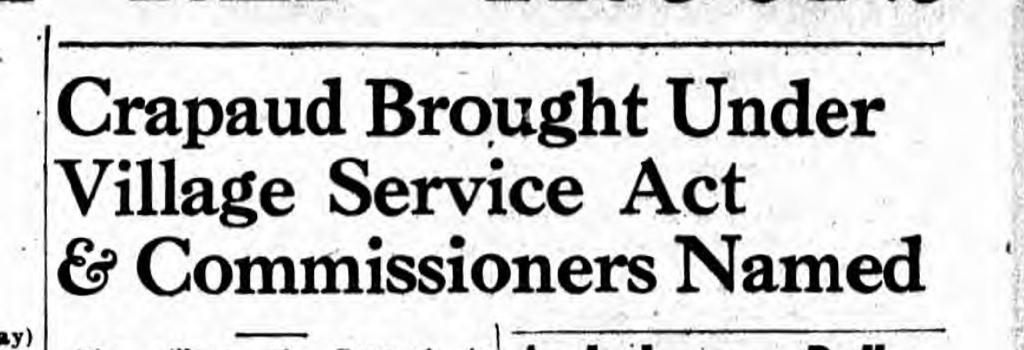
If you look at a map that shows the outlines of the boundaries of Prince Edward Island’s cities, towns and villages, it will not take long for your eyes to focus on the community of Crapaud.
Whereas typical municipal boundaries are craggy polygons, the Crapaud is round.
Round!
Look: it’s down near the bottom, just to the left of centre.
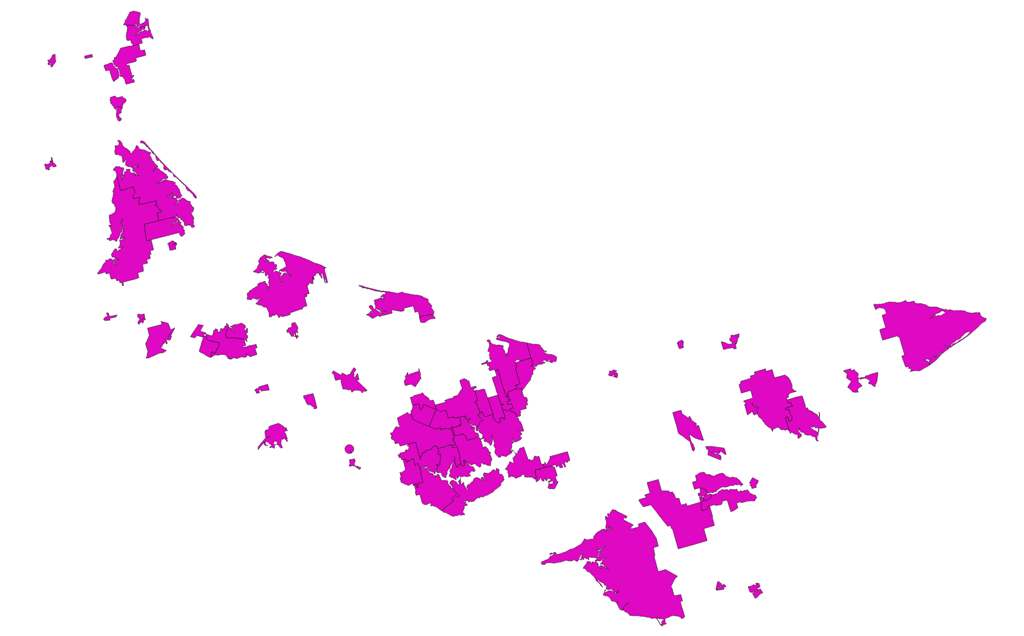
If you zoom in to look at Crapaud in isolation, its roundness is even more obvious:

The other item of note in this closer rendering is that there’s an odd sliver out of this circle that’s been excluded from the community, following the banks of the river.
Crapaud’s incorporation was proclaimed in the Royal Gazette of July 29, 1950, a proclamation that begins with one of the best act-names ever:
WHEREAS in and by Section 14(1) of Chapter 30 of the Acts passed by the Assembly of Prince Edward Island in the Session thereof held in the year 1950 and in the fourteenth year of Our Reign, intituled An Act to Enable the Inhabitants of Certain Villages to Supply Themselves with Certain Services, it is enacted as follows :—
Later in the proclamation, the boundaries are defined thus:
(b) the boundaries of the said Village of Crapaud to be within and extend to a radius of one-quarter mile from Crapaud Corner:
There is no hint in the proclamation why the village chose to organize itself circularly. And no mention of the missing sliver.
I called the village office today, and they didn’t know the reason.
A mystery to solve! Stay tuned.
My friend Jane Ledwell is launching her new book, Bird Calls, on Wednesday, December 14, 2016 at Upstreet Craft Brewing on Allen Street at 7:00 p.m.
Bird Calls is Jane’s poetic response to the 1854 account of Prince Edward Island by writer Isabella Lucy Bird; Paris may be the gayest city in the world, she wrote, and London the richest, but Charlottetown was “the most gossiping.”
I sit on the Publications Committee of Island Studies Press, which midwifed and is publishing the book; I’m happy to see it spring into life.

Did you know that Holland College offers a 2-year Human Services program here in Charlottetown?
I did not.
The program describes its program like this:
You will acquire basic knowledge of a variety of intellectual, developmental and physical disabilities, and learn the practical skills critical in assisting individuals with a disability through their life span to live to their full potential.
Thanks to the kindness of another parent, I found out about this program, and turned to one of the instructors for help finding a community aide to work with [[Oliver]] under the School-Age Autism Funding program of the Department of Education, Early Learning and Culture.
Within 30 minutes of sending the request I had the first resume in my in-box, and over the next few days it was joined by three more.
We’ve now identified two students of the program to spend time with Oliver, and they’ve proved capable, compassionate and flexible: just the right kind of person to walk in the footsteps of Oliver’s workers-past.
I post this here just in case others might profit from this; it really is a much-too-hidden gem!
I have participated in two protest rallies in my life.
The first was at the gates of the Warkworth Institution in Ontario in the late 1980s, a silent protest against the possible reintroduction of capital punishment in Canada.
The second was a few years ago in front of Province House, a reproductive rights rally organized by the PEI Reproductive Rights Organization.
In both cases the issues at hand were ones I felt so deeply about that I felt I had no choice but to lend my voice, and to set aside my feeling that change is better made quietly, deliberately and collaboratively that through shouting.
Tonight I’ll rally again, along side my son [[Oliver]], in front of the Legislative Assembly at a Rally for Democracy.
Why?
Many different reasons; but chief among them is a feeling, based on years of experience, that a diverse table is a better table, and that the current government’s move to slow the progress toward proportional representation in the Legislative Assembly is a move that ignores the fierce urgency of evolving the way we govern Prince Edward Island.
One of the things I’m most proud of regarding my term as president of the PEI Home and School Federation is the degree to which we increased the diversity of the two yearly meetings of our membership. We decided that having many people with a stake and role in public education around the table would improve the quality of the discussion, so we extended invitations beyond our usual invitations to the Minister of Education and their deputy, and broadened the list to include school trustees, school board staff, senior leaders in the Department of Education, representatives of the education unions, and to community members with an interest in education.
Which is how I found myself around a table this past April with Home and School members talking about how we could improve playgrounds. One of the people who joined us was Ricky Hood, at the time the official trustee of the English Language School Board, and someone with decades of experience in public schools. Ricky participated eagerly and helpfully in the conversation that ensued, and was able both to provide some historical insights, vision as to what the possibilities and limitations might be, and, perhaps more than anything else, made the conversation more like a planning session among partners than a cry into the wind.
It confounds me, in light of this, and many other similar examples, that so often the calls to broaden the diversity of the conversation is reacted to with a strong anti-viral response.
For example, back in 2013 home and school members passed a resolution Cross Appointments Between Health PEI and English Language School Board, our reasoning well-expressed in the preamble:
WHEREAS in recent years there has been a move to centralize the operational authority for both health and wellness (through the creation of Health PEI) and education (through the creation of a single English Language School Board), and
WHEREAS there is an increasing awareness of the connections between mental and physical health and success in education, and
WHEREAS many operational issues relating to public school education can benefit from the perspective, resources and services of the health system, and
WHEREAS many operational issues in relation to mental and physical health can benefit from the perspective, resources and services of the public education system,
The response?
The Minister of Education: As this resolution is a school board matter, I will defer the decision on this resolution to the school board.
The English Language School Board: Therefore, the English Language School Board understands that the Minister of Education has sole authority to increase the number of members for each school board. The School Act does not authorize a school board to increase the number of its members, ex officio or otherwise.
Health PEI: The resolution regarding cross-appointments between Health PEI and the English Language School Board tabled by the Home and School Federation is certainly a very interesting proposal to consider. At this time, in my role as Chair, I have discussed the proposal with our Nominations Chair. We would welcome the opportunity to discuss our cunent nominations process in more detail.
So, in other words, one “sounds interesting” and two conflicting “not my departments,” pointing the finger toward the other.
Needless to say, no action was taken.
This viral response against increased diversity was on strong show in the Legislative Assembly last Tuesday as it debated Motion 80, the government’s “hold on there, let’s not get carried away” response to the interpretation of the plebiscite results.
Hon. Robert Henderson used the opportunity to re-debate the very notion of proportional representation:
I mentioned before, in New Zealand, 13 political parties, seven parties represented, coalitions are always the norm, and parties leading the coalition tend to be really down to just two parties, the National Party and the Labour Party, that always lead the coalition.
In Israel, if you take a look at that one, which is directly a proportional representation system, term limits are four years. It has rarely lasted four years. Since implemented, no party has ever won a majority government. Voters select a party on a ballot and parties have 42 days then to form a coalition. If you look at their voter turnout, in 1992, 77%, and in 2006, 63%.
If you look at another parliament that might be a little bit closer to PE, Iceland has 15 parties that are on the ballot of which seven have seats in the legislature. Iceland, population is about double ours. They have about 237,000 eligible voters. They have 63 seats in their parliament and in the most recent election the Independence Party had 21 seats, the Pirates had 10, Greens, Progressive Reform, Brighter Futures, so there are seven parties have seats in the House. This is a system that has been in place for some time.
Greece is another one. Greece has 300 seats, of which 288 are represented by 56 particular ridings of which 12 are off lists. Forty years they’ve been doing some form of this system. They had to change it 17 times to try to get it a little more closer to a system that worked from direct proportional representation to a system now that’s called a reinforced proportional representation. In Greece 20 parties, eight parties in parliament, have over 9 million voters. Since 2007 – I think this is a neat point – eight elections in Greece. I know Greece has its problems, but PEI has had three elections during that period of time.
What Mr. Henderson is suggesting, I think, is that diversity is bad for government, leads to instability, and therefore, logically, that our current system is better.
Bush Dumville, MLA pursued a different, more direct tack, suggesting that what you and I might call “diversity” is really government by “special interest groups”:
The proportional representation lobby and Honour the Vote campaign is well organized with advertisements, robocalls, social media pressure, and even there was a suggestion on Facebook for civil disobedience. It appears to be a well-funded lobby of special interest groups. I do not want our province to be covered by special interest groups. I want PEI to be governed by parties which have broad-based policies and which garner the support of a wide range of Islanders.
A first-past-the-post electoral system discourages single issue or limited issue parties and encourages parties to develop broader policies that appeal to the majority of voters.
What both Hon. Mr. Henderson and Mr. Dumville appear to assume in their statements is that a more diverse parliament would work in the same fashion is today’s less diverse parliament, only with heightened cacophony and chaos.
What they ignore is the possibility that increased diversity might not only increase the quality of the discussion by integrating a broader collection of viewpoints, but that the very nature of how the discussion is conducted – the spirit of the discussion, so to speak – would change as well.
In addition to Islander’s well-worn love of the duopolistic practice of politics, which generally descends into daily variations of “we’re the best; you’re an idiot” in the legislature, there lurks, deep in the cultural DNA, another, even more powerful impulse, which is the spirit of collaboration. This spirit is on daily display from one end of the Island to the other in the way we conduct our lives outside of the legislature, and there is no reason to think that it’s not possible to bring it inside the rail as well.
For example, at a provincial home and school meeting, when the representative of the western end of the Island mentioned that it was unreasonable to expect people from West Prince to drive to Charlottetown or Summerside for home and school training workshops, the reaction of their peers on the provincial board was simply to organize workshops in West Prince, not to descend into internecine geo-rivalry discussions. In my experience this is the rule rather than the exception: it is only on the floor of the Legislature that we seem to lose our ability to think and act collaboratively.
But what of this fierce urgency? Why should we not, as the government suggests, simply wait for 2023 for proportional representation to be introduced?
Here’s an excerpt from remarks by U.S. Secretary of Education Kathleen Sebelius on the anniversary of the March on Washington:
When Dr. Martin Luther King, Jr. spoke at the March on Washington, he described a “fierce urgency of now.” He reminded a divided nation that we need one another, and that we are stronger when we march forward, together. “We cannot walk alone,” he said. “And as we walk, we must make the pledge that we shall march ahead. We cannot turn back.”
A half century later, Dr. King’s words have renewed meaning.
For every little boy or girl in America whose health lies in the balance, there is an urgency of now.
For every one of our neighbors who lives day-after-day in fear because they do not have insurance, there is an urgency of now.
For every mom or dad who has faced bankruptcy because of a mounting medical bill, there is an urgency of now.
Without the opportunity to live a healthy life, there is no opportunity to live the American dream or participate fully in our communities. Without the freedom which comes from having access to quality health care, there is no freedom to reach our full potential in the workforce or watch our kids or grandkids grow up. Without the security of health insurance, there is no economic security for middle-class families, and so many other families working their way into the middle class.
The time for division and debate has passed. Now is the time to march forward.
While Dr. King was speaking of a different division in a different context, I believe the spirit of his words – the fierce urgency of now – applies here on Prince Edward Island as we sit as this juncture.
A call for increased diversity in the way we govern ourselves is urgent because for too long we have chosen our representatives from a smaller subset of the population, one that doesn’t reflect the many hues of the human experience on Prince Edward Island. What Mr. Dumville fears in the integration of “special interests” into the legislature looks very different if you are someone whose voice has never had a place there; I believe we cannot forge a truly progressive, prosperous, just Island together until we right this historical wrong.
I believe a step toward more proportional representation is one way we can do that; to delay is to turn a blind eye to an obvious course toward improving our lot, a course that was well and definitively expressed through the plebiscite.
And so tonight I will join my voice with others to make it clear that I expect the results of the plebiscite to be honoured in both letter and spirit, and I expect to be able to sit in the public gallery of a more diverse, collaborative Legislative Assembly in 2019.
Like many people on Prince Edward Island, I’ve been glued to my TV set this week watching the live broadcast of the Legislative Assembly as members debated two contrasting motions related to the recent electoral reform plebiscite in which Islanders chose Mixed Member Proportional representation as our new mechanism for electing MLAs.
Motion 54, introduced by Peter Bevan-Baker and seconded by Sidney MacEwen was the “okay, let’s do this thing!” motion.
Motion 80, introduced by Hon. Wade MacLauchlan and seconded by Pat Murphy was the “hold your horses, let’s not get crazy” response.
During debate on Motion 80, Peter Bevan-Baker, as part of making the point that Islanders who didn’t vote should not be considered in the deliberations, quoted a tweet I made on November 8, in reaction to early signs from the government that it was not planning to act definitively on the results of the plebiscite:
I could not agree more. We cannot give these wasted votes any credence as we debate the result. Let us confine our discussion to those Islanders who made the effort to get out and to vote.
As one Islander so poignantly tweeted the day after the results were released – by which time, I should say, the hon. Premier had so rapidly and casually dismissed the results as, I quote, doubtful – here’s the tweet: I studied and discussed the options. I watched the videos, took the bus in the rain to the polling station to vote. My choice won. What did I do wrong?
Indeed.
This is the first time I’ve had a tweet quoted on the floor of the Legislature. It may be the first time I’ve had a tweet quoted anywhere.
The feeling behind the tweet is one that’s only amplified in the days since: I took the effort to learn the options available, inside and out; I took the effort to talk about the options with my able-to-vote 16 year old son; I discussed about the options with friends and colleagues.
And I did take the bus, in the rain, to vote.
And yet the government has chosen, for reasons I cannot completely fathom, to try to equally-as-much divine the intent of the non-voters in charting its course forward, reeling back the intent of the plebiscite to a generalized expression of a wish for change.
Although I didn’t ask my tweet be quoted – it was a surprise to hear it – I’m proud to have unknowingly loaned the words to Peter Bevan-Baker to help to make his case.
And I remain optimistic that we’ll be voting MMP in the next election.

 I am
I am